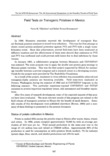Field Tests on Transgenic Potatoes in Mexico
JIRCAS international symposium series
| ISSN | 13406108 |
|---|---|
| 書誌レコードID(総合目録DB) | AA1100908X |

本文フルテキスト
intlsymp-5_157-162.pdf185.16 KB
In 1990, Monsanto scientists reported the development of transgenic Russet Burbank potatoes resistant to mixed virus infections. This was the first attempt to obtain coated protein-mediated protection against PVX and PVY with a single transformation event. Since this achievement, several field tests have been conducted at different locations and the effectiveness of these tests showed that resistance to PVX and PVY was confirmed and could prevent yield losses due to dual infections by these viruses.
In January 1991, a collaborative program between Monsanto and CINVESTAV was initiated. The main purpose was to apply the double coat protein gene strategy to Mexican potato varieties. This was the first project supported by ISAAA for technology transfer between a private company and a research center in a developing country. Funds for the project were provided by The Rockefeller Foundation.
As a result of the project, resistance to virus infection was successfully achieved and transgenic-Alpha potatoes are becoming available. Field tests were conducted at Prosser, Washington during the summer of 1992 and at CINVESTAV Irapuato in the following summer. This particular experience exposed CINVESTAV and INIFAP scientists to several important regulatory issues, risk assessment and biosafety regulations.
After five years of research development, some of the expected impacts of this project have been evaluated. The most relevant results of this program are related to the field release of transgenic potatoes in Mexico for the benefit of small farmers. Scientific results of this development were published elsewhere (Rivera, 1995) and a summary of these findings is presented in the present document.
In January 1991, a collaborative program between Monsanto and CINVESTAV was initiated. The main purpose was to apply the double coat protein gene strategy to Mexican potato varieties. This was the first project supported by ISAAA for technology transfer between a private company and a research center in a developing country. Funds for the project were provided by The Rockefeller Foundation.
As a result of the project, resistance to virus infection was successfully achieved and transgenic-Alpha potatoes are becoming available. Field tests were conducted at Prosser, Washington during the summer of 1992 and at CINVESTAV Irapuato in the following summer. This particular experience exposed CINVESTAV and INIFAP scientists to several important regulatory issues, risk assessment and biosafety regulations.
After five years of research development, some of the expected impacts of this project have been evaluated. The most relevant results of this program are related to the field release of transgenic potatoes in Mexico for the benefit of small farmers. Scientific results of this development were published elsewhere (Rivera, 1995) and a summary of these findings is presented in the present document.
| 作成者 | Victor M. Villalobos Rafael Rivera-Bustamante |
|---|---|
| 公開者 | Japan International Research Center for Agricultural Sciences |
| オンライン掲載日 | |
| 号 | 5 |
| 開始ページ | 157 |
| 終了ページ | 162 |
| 言語 | eng |
